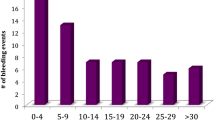Abstract
Introduction
With the increasing performance of bariatric surgery, rare complications are becoming prevalent. We review the diagnosis and treatment of dysautonomia after bariatric surgery and the limited treatment options available. We summarize the suggested mechanisms and explain why a complete understanding of the etiology has yet to be determined.
Methods
In accordance with the Preferred Reporting Items for Systematic Reviews and Meta-Analyses (PRISMA) guidelines, a systematic review was performed.
Results
Of 448 studies identified in the literature search, 4 studies were reviewed, describing 87 patients diagnosed with dysautonomia. We present a patient who developed severe dysautonomia following conversion of sleeve gastrectomy to gastric bypass.
Conclusion
Treatment needs to focus on optimizing nutrition, avoiding hypoglycemia, and optimizing volume status.



Similar content being viewed by others
References
Zagury L, Moreira RO, Guedes EP, Coutinho WF, Appolinario JC. Insulinoma misdiagnosed as dum** syndrome after bariatric surgery. Obes Surg. 2004;14(1):120–3.
Marsk R, Jonas E, Rasmussen F, Näslund E. Nationwide cohort study of post-gastric bypass hypoglycaemia including 5,040 patients undergoing surgery for obesity in 1986–2006 in Sweden. Diabetologia. 2010;53(11):2307–11.
Service GJ, Thompson GB, Service FJ, Andrews JC, Collazo-Clavell ML, Lloyd RV. Hyperinsulinemic hypoglycemia with nesidioblastosis after gastric-bypass surgery. N Engl J Med. 2005;353(3):249–54.
Patti ME, McMahon G, Mun EC, et al. Severe hypoglycaemia post-gastric bypass requiring partial pancreatectomy: evidence for inappropriate insulin secretion and pancreatic islet hyperplasia. Diabetologia. 2005;48(11):2236–40.
Vanderveen KA, Grant CS, Thompson GB, et al. Outcomes and quality of life after partial pancreatectomy for noninsulinoma pancreatogenous hypoglycemia from diffuse islet cell disease. Surgery. 2010;148(6):1237–45 (discussion 1245–1236).
Salehi M, Vella A, McLaughlin T, Patti ME. Hypoglycemia after gastric bypass surgery: current concepts and controversies. J Clin Endocrinol Metab. 2018;103(8):2815–26.
Cryer PE. Mechanisms of hypoglycemia-associated autonomic failure in diabetes. N Engl J Med. 2013;369(4):362–72.
Lascano CA, Szomstein S, Zundel N, Rosenthal RJ. Diabetes mellitus-associated diffuse autonomic dysfunction causing debilitating hypotension manifested after rapid weight loss in a morbidly obese patient: case report and review of the literature. Surg Obes Relat Dis. 2005;1(4):443–6.
Billakanty SR, Kligman MD, Kanjwal YM, et al. New-onset orthostatic intolerance following bariatric surgery. Pacing Clin Electrophysiol. 2008;31(7):884–8.
Loh KP, Ogunneye O. Malignant cardioinhibitory vasovagal syncope - an uncommon cardiovascular complication of Roux-en-Y gastric bypass surgery: the fainting syndrome! Int J Cardiol. 2013;164(3):e38-39.
Zhang JB, Tamboli RA, Albaugh VL, et al. The incidence of orthostatic intolerance after bariatric surgery. Obes Sci Pract. 2020;6(1):76–83.
Arble DM, Sandoval DA, Seeley RJ. Mechanisms underlying weight loss and metabolic improvements in rodent models of bariatric surgery. Diabetologia. 2015;58(2):211–20.
Maier C, Schaller G, Buranyi B, et al. The cholinergic system controls ghrelin release and ghrelin-induced growth hormone release in humans. J Clin Endocrinol Metab. 2004;89(9):4729–33.
Broglio F, Gottero C, Van Koetsveld P, et al. Acetylcholine regulates ghrelin secretion in humans. J Clin Endocrinol Metab. 2004;89(5):2429–33.
Katsuura G, Asakawa A, Inui A. Roles of pancreatic polypeptide in regulation of food intake. Peptides. 2002;23(2):323–9.
le Roux CW, Neary NM, Halsey TJ, et al. Ghrelin does not stimulate food intake in patients with surgical procedures involving vagotomy. J Clin Endocrinol Metab. 2005;90(8):4521–4.
Zhang W, Waise TMZ, Toshinai K, et al. Functional interaction between Ghrelin and GLP-1 regulates feeding through the vagal afferent system. Sci Rep. 2020;10(1):18415.
Sundbom M, Holdstock C, Engström BE, Karlsson FA. Early changes in ghrelin following Roux-en-Y gastric bypass: influence of vagal nerve functionality? Obes Surg. 2007;17(3):304–10.
Maser RE, Lenhard MJ, Irgau I, Wynn GM. Impact of surgically induced weight loss on cardiovascular autonomic function: one-year follow-up. Obesity (Silver Spring). 2007;15(2):364–9.
Perugini RA, Li Y, Rosenthal L, Gallagher-Dorval K, Kelly JJ, Czerniach DR. Reduced heart rate variability correlates with insulin resistance but not with measures of obesity in population undergoing laparoscopic Roux-en-Y gastric bypass. Surg Obes Relat Dis. 2010;6(3):237–41.
Author information
Authors and Affiliations
Corresponding author
Ethics declarations
Ethics Approval
For this type of study, formal consent is not required.
Consent to Participate
Informed consent does not apply.
Conflict of Interest
Drs. Addison and Carsky have no conflicts of interest. Dr. Patti is a consultant at Eiger, Poxel, Hanmi, Astra Zeneca, MBX Biosciences, and Fractly and has an investigator-initiated research grant at Dexcom; these are unrelated to the present manuscript. Dr. Roslin is a consultant for Medtronic and Johnson and Johnson and has a research grant from Medtronic; these are unrelated to the present manuscript. We gratefully acknowledge grant support from NIH DK121995 (to MEP).
Additional information
Publisher's Note
Springer Nature remains neutral with regard to jurisdictional claims in published maps and institutional affiliations.
Mary Elizabeth Patti and Mitchell Roslin are co-senior authors.
Key Points
1. Hypoglycemia should be assessed in patients with syncope or autonomic symptoms.
2. Medical therapy should be considered for orthostasis but can be ineffective.
3. Advanced cases may not benefit from surgical intervention.
4. Successful treatment of hypoglycemia may not reverse symptoms of dysautonomia.
Supplementary Information
Below is the link to the electronic supplementary material.
Rights and permissions
About this article
Cite this article
Addison, P., Carsky, K., Patti, M.E. et al. Hypoglycemia and Dysautonomia After Bariatric Surgery: a Systematic Review and Perspective. OBES SURG 32, 1681–1688 (2022). https://doi.org/10.1007/s11695-022-05960-x
Received:
Revised:
Accepted:
Published:
Issue Date:
DOI: https://doi.org/10.1007/s11695-022-05960-x




